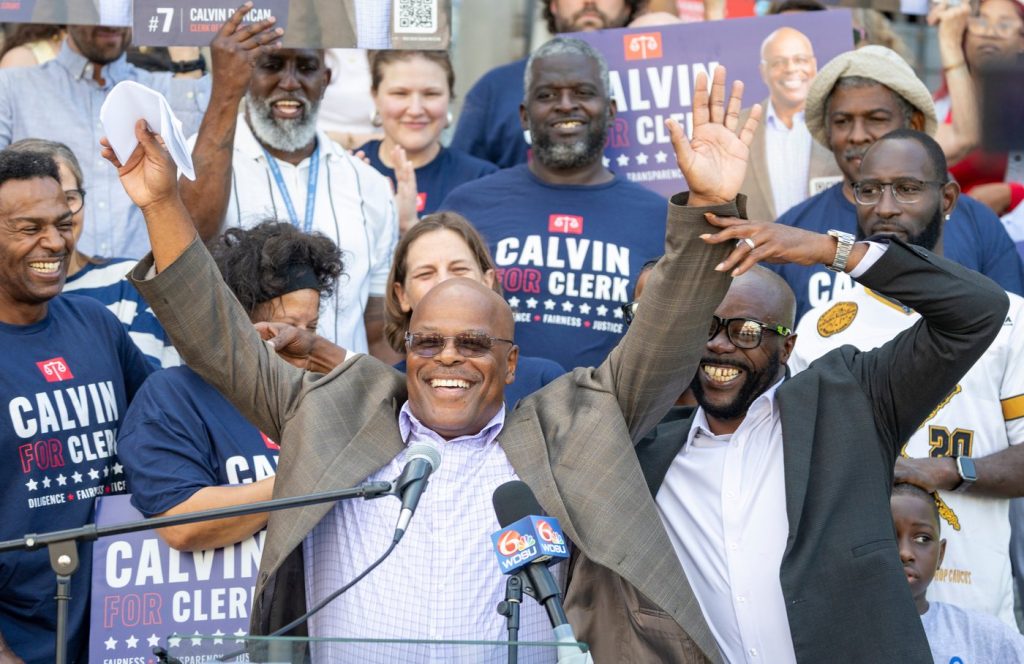NEW ORLEANS (AP) – In a significant turn of events, Calvin Duncan, a man who spent three decades wrongfully imprisoned for murder, has been elected as the new clerk of criminal court in New Orleans. His election occurred despite opposition and challenges regarding his past from state authorities. Duncan was convicted in connection with a fatal shooting that took place in 1981. After years of fighting for his innocence, he uncovered evidence that exposed police misconduct, leading to the vacating of his conviction by a judge in 2021.
Duncan's electoral success comes as a result of overwhelming public support, as he garnered 68% of the vote according to unofficial returns from the Louisiana secretary of state’s office. He is now officially listed in the National Registry of Exonerations, marking a profound victory not only for himself but also for others who have suffered from wrongful convictions.
During the campaign, Duncan faced attacks from his opponent, incumbent Democrat Darren Lombard. Lombard, throughout debates and media campaigns, asserted Duncan's guilt in the murder case. Additionally, Louisiana Attorney General Liz Murrill publicly challenged Duncan's innocence, despite a letter signed by more than 160 legal professionals affirming his exoneration. The letter claimed, “The facts, the law, and the procedural history are clear: Calvin Duncan was wrongfully convicted, he has proved his innocence, and he is now fully exonerated.”
Duncan's journey through the electoral process was notable. In an October primary, he achieved 47% of the vote in a competitive three-candidate race, narrowly advancing to a runoff against Lombard, who received 46%. Although Lombard gained support from the city’s political elite, including the mayor-elect, Duncan ultimately triumphed in the runoff election held on November 15.
Following the announcement of Duncan’s victory, Lombard issued a statement congratulating him and expressed his willingness to assist with a smooth transition for the office, emphasizing the importance of maintaining continuity in operations.
At 62 years old, Duncan faced considerable challenges during his wrongful incarceration, having entered prison with only an eighth-grade education. However, he became a legal expert behind bars and actively assisted fellow inmates in challenging unconstitutional practices. Eventually, Duncan pursued a legal career and became an attorney, allowing him to advocate for justice more effectively.
Significantly, Duncan's legal efforts contributed to a landmark decision by the U.S. Supreme Court in 2020, which resulted in the ending of non-unanimous jury convictions in Louisiana and Oregon, the last states to uphold this practice rooted in the Jim Crow era.
With his new position as the clerk of criminal court, Duncan aims to reform the handling of court records, ensuring fair treatment and increased respect for legal documentation. He recalled from his time in prison the difficulty that incarcerated individuals faced in accessing basic court documents. Although New Orleans still primarily relies on paper records, the city has announced plans to implement a digital filing system in the future. However, challenges persist, as an incident in August saw important court records mistakenly discarded, necessitating retrieval efforts from a landfill.
Calvin Duncan's election stands as a testament to perseverance and resilience in the face of injustice, as he transitions from being a victim of a flawed system to a key figure within that system, determined to drive change for others navigating the complexities of the criminal justice system.










